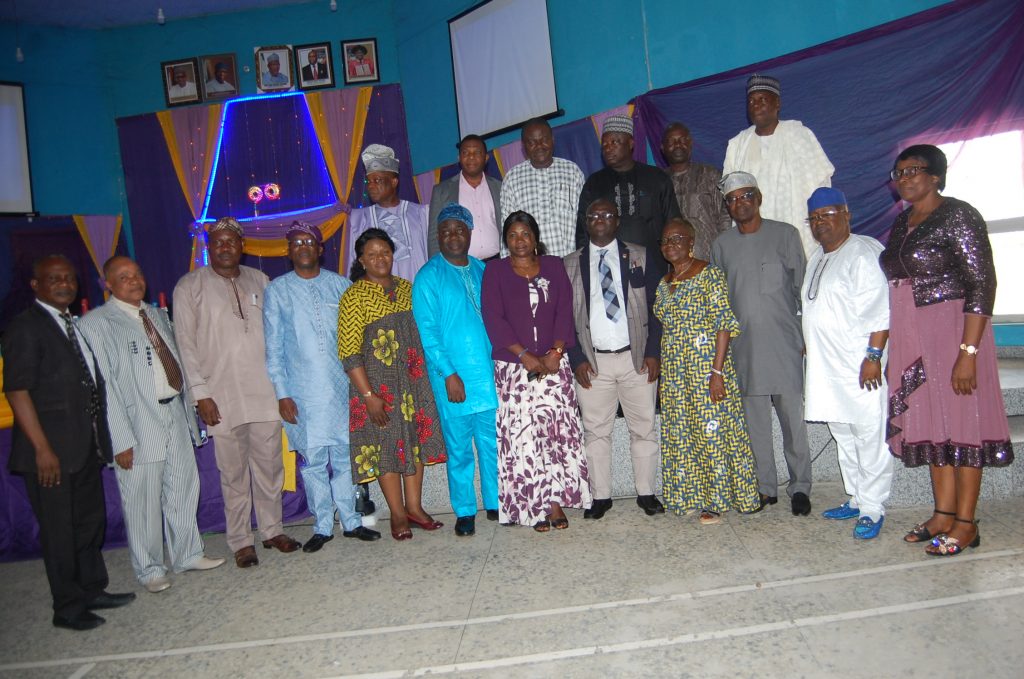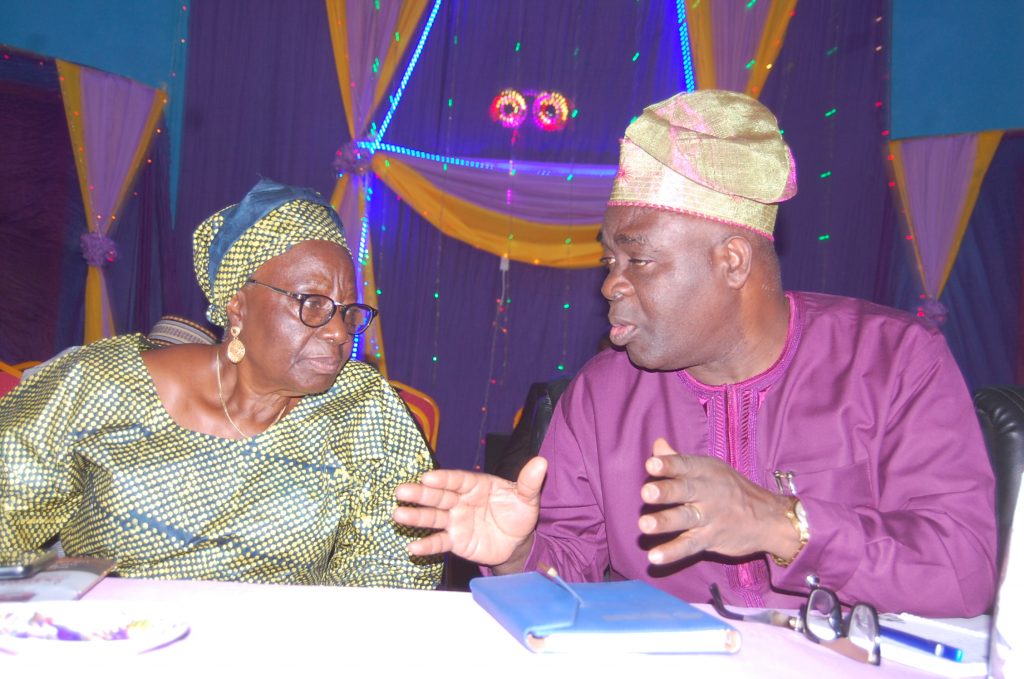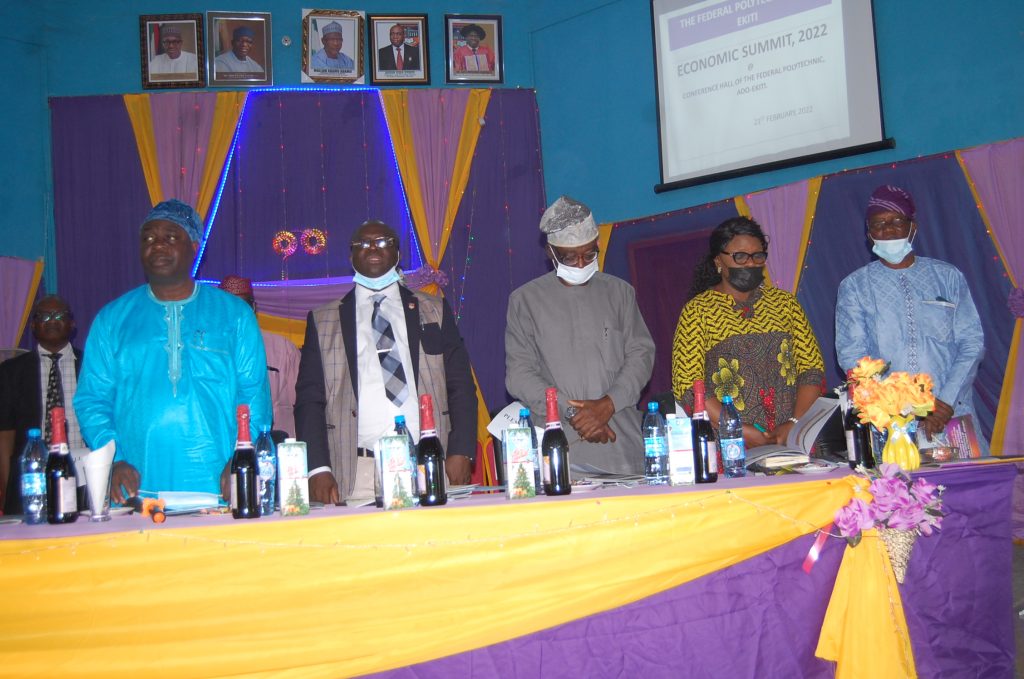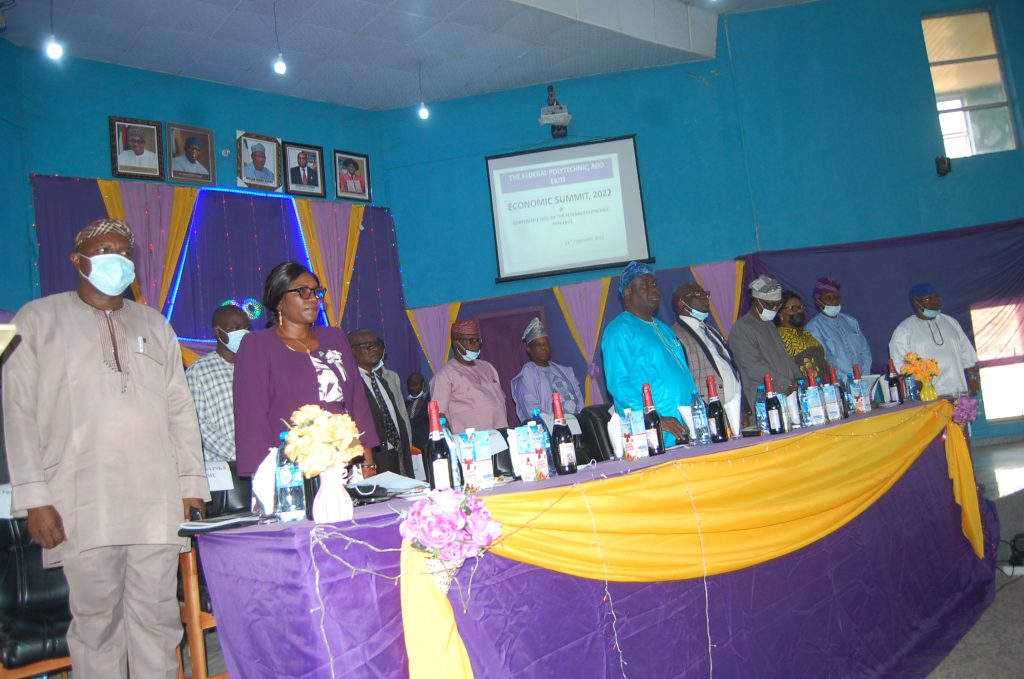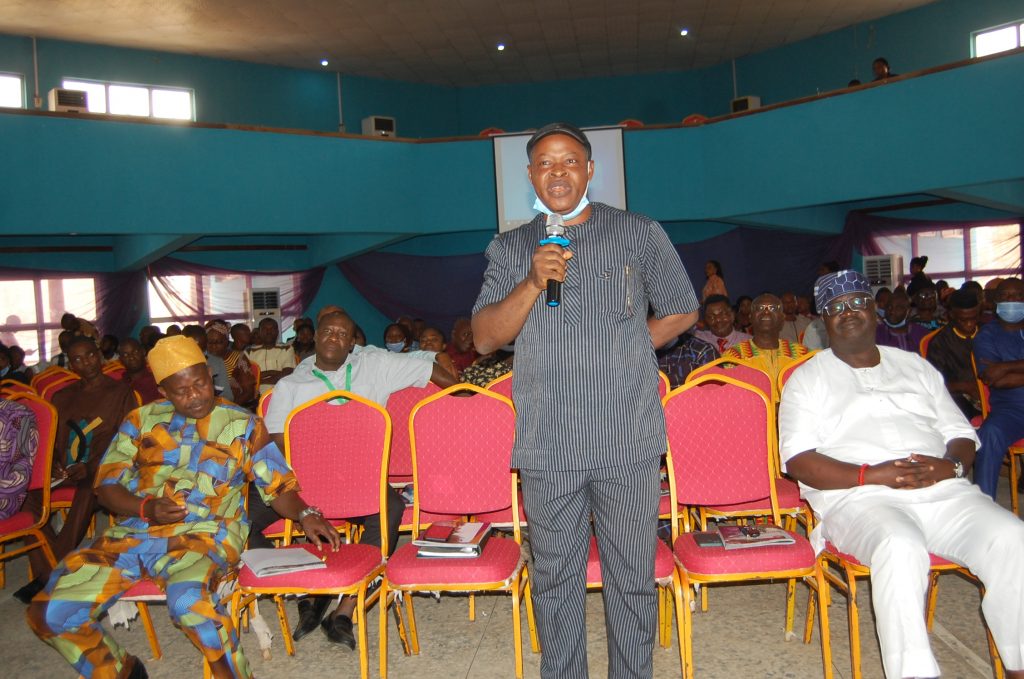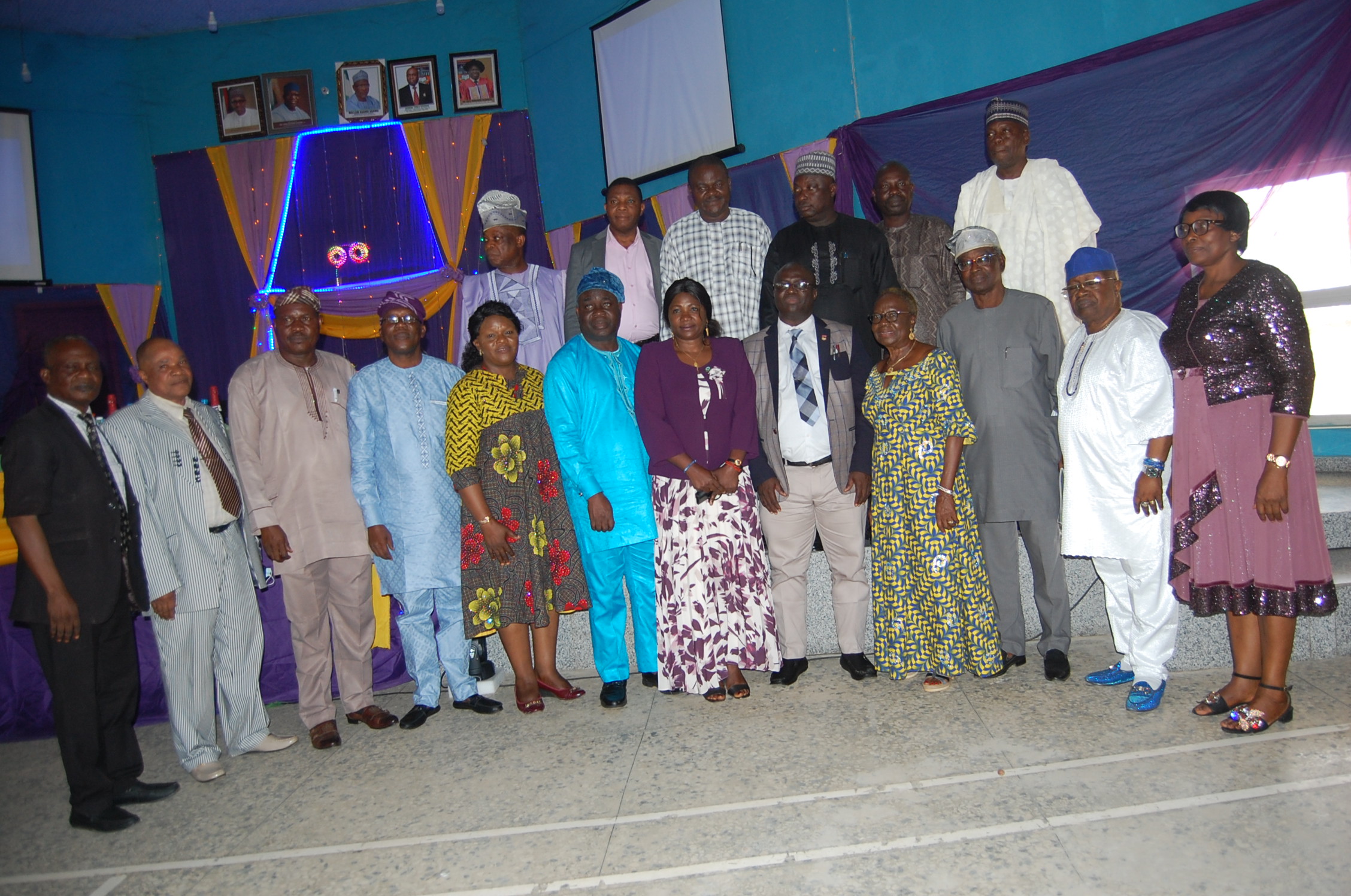Economic Summit Canvasses Adequate Funding For Polytechnics
The Federal Polytechnic, Ado-Ekiti has been described as one of the foremost Skills Training and Development Impacting Institution that has the full potential to make profitable impacts in the Nigerian Competitive Economy, if adequately funded.
The assertion was part of the conclusions reached during a two-day Economic Summit held at the Institution on 21st and 22nd of February, 2022 with the Theme “Motivation, Productivity and Institutional Progress: The challenge of harnessing the potentials of The Federal Polytechnic, Ado-Ekiti”
In his opening remarks, the Convener of the Summit and Chairman of the 11th Governing Council, Akogun Iyiola Oyedepo stated that the essence of the Economic Summit was to make everyone in the citadel of learning great leaders that would take the Institution to its zenith, while operating within the perimeter of the vision of Polytechnic education in Nigeria.
Also, see: Stakeholders Advocate Improved Funding for Polytechnic Education
Akogun Oyedepo stressed that the vision of Polytechnic education in Nigeria is basically Science and Technology, which must be devised to solve environmental problems, thereby increasing the revenue generating capacity of Institutions. However, he observed that it was unfortunate that “The Federal Polytechnic, Ado-Ekiti has 2,378.029 hectares of land, more than 2/3 of which are underutilized especially in the area of agriculture.”
The Governing Council Chairman, whose address was titled: “Polytechnic Education In Nigeria: Vision Betrayed or Implemented” observed that the 29 accredited Academic Departments of the Polytechnic were fully backed with vibrant, middle class people of high taste, who are capable of doing one thing or the other in order to make profitable impacts on the Nigerian competitive economy.
He stressed that in a global race for supremacy in the field of technology, “much is therefore expected from everyone in the Institution to contribute their own quota; be opened to researches; embrace agriculture and depend less on the money given by the Federal Government, so as to make the Polytechnic financially self sustained.”
Akogun Oyedepo also laid emphasis on the need to follow the trend of aspiring world leaders in economic and technological developments, pointing out that “China in its bid to focus on training engineers, senior technicians, and other highly skilled workers rather than pursuing over – academic, highly theoretical studies; have decided to change 600 of her general Universities to Polytechnics.”
Also, see: FPA Releases 2021/2022 ND Evening BATCH 1
In his remarks, a former Rector of The Polytechnic and the Chairman of the occasion, Prof. Olawunmi Ajaja gave kudos to the Management of the Institution for organizing the Economic Summit, noting that it would help catapult the Polytechnic to its peak, and would in turn stir up other Institutions to take a cue from.
Prof. Ajaja stated that the Polytechnic had no business depending solely on Government subventions, but rather be on the front line in improving the economy of the Country through maximizing the Internally Generated Revenue sources that are available in the Institution.
Earlier in his welcome address at the occasion, Rector of The Federal Polytechnic, Ado-Ekiti, Dr. Dayo Oladebeye said the theme of the Economic Summit was apt and germaine as there was need for adequate motivation, bulk of which comes from sustainable flow of income.
He noted that the theme chosen for the Economic Summit was borne out of the Motto of the Institution “Training for Skills and Expertise”, which reflects the sincere resolve and determination of the 11th Governing Council and Management to evolve a pragmatic result oriented and success driven approach towards turning around the fortunes of the Polytechnic by harnessing the enormous potentials of both human and material resources for the attainment of technological development and growth of the Institution.
Dr. Oladebeye also emphasised that the Summit, which had seasoned and experienced guest speakers as faculties would serve as an eye opener to various untapped opportunities within and around the Polytechnic, stressing that “It will spur our minds to in-depth innovative thinking and inspire us to be resolute in our strategic approaches in bringing the potentials of the Institution to lime light for full productive and progress-driven explorations far better than it had been in the past.”
Also, see: SERVICOM Visiting Team Commends FPA for Efficiency
The keynote Address Speaker and Rector of The Federal School of Surveying, Oyo, Dr. Dupe Nihinlola Olayinka-Dosunmu, who spoke on the topic: Breaking The Jink of Research in The Polytechnic’s System: A Panacea For Harnessing The Potentials of Federal Polytechnic/Monotechnic” submitted that no Nation can grow beyond her level of Research and that accounts, for why Academic Institutions were set up for manpower building, Research and Development for maximum productivity.
Dr. Olayinka-Dosunmu further averred that “Polytechnic education plays a vital role in human resource development of a Country by creating skilled manpower, enhancing industrial productivity and improving the quality of life but unfortunately, the objectives seems far from being achieved as a result of challenges, which include underfunding, disconnect between the Polytechnics and the Industries, lack of steady power supply, infrastructure gap, understaffing and other discrimination against the Polytechnics and their products by the Nigerian Government and the Nigerian society at large.”
The keynote speaker at the maiden Economic Summit of the Polytechnic also noted that the Polytechnic was not established to play the second fiddle as there are brilliant lecturers in the system who have contributed to knowledge in high impact, local and international paper and journal publications.
She therefore highlighted some potentials that could be harnessed on a short term basis through the greatly endowed professionals in different management and technological fields of the Polytechnic as integrated farms and business outfits (mechanized agriculture), farming different research groups based on expertise and interest to address current societal problems, introducing management acumen in every course of study and building synergy with industries.
The Lead Paper 1 presenter, Prof. Femi Omotosho who focuses more on Teamwork and motivation of staff for quality management and high productivity affirmed that Polytechnics are important to the socio-economic growth and development of any nation.
Prof. Omotosho stated that Polytechnics cannot be viable, virile and productive without the support of its entire workforce. Hence the need for support, trust, cooperation among the management, staff and students so as to pull resources together, and work harmoniously towards realizing the goals and objectives of the system.
Also, see: Stakeholders Advocate Improved Funding for Polytechnic Education
The Professor of Political Science also emphasised on the importance of leadership as there is dire need for dynamic, responsible result oriented and purposeful people that will value development, inculcate discipline, promote ethical values, and engender accountability and transparency. While clamouring for good leadership, he charged the management to also focus on some of the people-oriented approaches such as workers’ motivation, team-building, organisation or system restructuring, stakeholders’ satisfaction, among others, in order to achieve motivation, productivity and Institutional progress.
In a related development, Dr. Olatunde Adekola (Senior Education Specialist with the World Bank), posited that to achieve the potentials of the Polytechnic, policy makers should lead in sensitizing and advocating for equitable access and quality education for every child to complete basic and secondary education with its resources.
Dr. Adekola who presented the Lead Paper 2 stressed on the need to get international development partners, who were always willing to encourage not only better quality technical education outcomes, but also to promote more efficient Polytechnic education that innovate and respond positively to meaningful performance – based on allocation of resources and accountability systems.
The World Bank expert stated that the Polytechnic needs more funding from scaling up its allocation to provide incentive for productivity; improvement; Federal Government spending; local government input; non – state actors provision and external funding from donor agencies to widen access to equitable quality Polytechnic education, which would directly influence national competitiveness.
He added that leveraging on digital transformation, more investment for quality education with special focus on ICT, STEM, TVET, including formal and informal apprenticeship linkage with NSQF, skill development and youth empowerment with particular focus on female students would drive the Institution into achieving economic growth, productivity and progress.
Also, see: FPA Releases 2021/2022 ND Evening BATCH 1
While presenting the Lead Paper 3, Engr. Lateef Kolawole noted that “what we put our resources into would determine the results we get from it,” and appealed to the Management of the Polytechnic to look inwards and engage the Institution land mass in large scale agricultural activities such as crop and fish farming, among others.
Engr. Kolawole said the selection of few productive agricultural enterprise, with the training of students and staff in cultivating crops in large scale would thereby create job opportunities for so many and in turn create internally generated revenue into the purse of the Polytechnic.
In his own submission, the Lead Paper 4 presenter, Prof. Sunday Babatunde Akindele, who spoke on “Improving Academic Productivity For Innovation: A Discourse”, opined that productive workforce and manpower resources constitute the spring board for organizational innovation. He added that academic productivity is best measured through research publication and innovation results from the practice.
Prof. Akindele, a member of Governing Council, who chaired the Planning Committee for the Economic Summit, said that to successfully realize innovative projects, educational Institutions need to encourage the staff, motivate them, be committed to their welfare and provide good enabling environment to bring out their best productive capacity.
He also charged the workforce by way of reciprocating, must strive to meet the requisite standard which usually form the basis of the corporate vision, mission and pursuit, adding that when everyone puts in their best, the desired innovation that will give the Polytechnic a pride of place among its peers would be easily achieved.
In the Lead Paper 5, presented by Dr. Michael Olawale Akinola, who spoke on the topic: “Utilization of Federal Polytechnic Land for Agricultural Production for Economic Empowerment And Mitigation Against Encroachment” observed that food security and safety are major indices in distinguishing between developed and developing nation of the world.
Dr. Akinola stated that with the increasing rate of food prices, which has made it difficult for the common man to feed in the country, it is pertinent that all stakeholders in Nation building should come to the rescue. To this end, the Lead paper 5 presenter noted that the Federal Polytechnic Ado Ekiti has the capacity to change the narratives of its host communities, the host state and the country in general, given the vast availability of land, which is suitable for agricultural activities.
He averred that students could be trained to cultivate using indigenous technology to develop entrepreneurs, add value to the farm produce and in turn create job opportunities for most of them who are gradually embracing social vices due to lack of jobs.
Dr. Akinola, who is the pioneer Dean of the School of Agriculture and Agricultural Technology and also a current member of the Polytechnic’s Governing Council was emphatic that engaging the Polytechnic land mass in massive agriculture will also solve problems of land encroachment by unauthorized individuals, who now compete with the Institution for her land resources as grazing reserves and habitation.
He further emphasised that the vast land of the Institution should be put into massive production of crops such as tree crops, cereals, legumes and tuber crops, while a considerable part of the land could be deployed into ranching for cattle and other small ruminant animals. He added that the listed investments are economic fortunes to the Polytechnic, if they are explored.
Leading the eleven position papers presented by various Internal Stakeholders on the second day of the Summit, the Rector, Dr. Dayo Oladebeye set the tone for discussion on the viable window of improved revenue through diligent service delivery across the revenue prone Divisions/Directorates/Departments/Centres and Units of the Polytechnic.
The Registrar, Mrs. Kehinde Ekanem while speaking on “Understanding The Nature And Scope of Public Personnel Administration: The Role of The Registry”, noted that the existence, survival and advancement of an organisation depends solely on how its personnel is being utilized and managed.
Also, see: FPA Releases 2021/2022 ND Evening BATCH 1
Mrs. Ekanem said that the role of Registry in the Public Service cannot be overemphasized as it ensures that all plans, policies and programmes of government for the society are implemented for the benefits of the citizens and highlighted some of the benefits that the system could tap into in order to facilitate maximum success as adequate funding; improvement in general staff welfare; quality staff training and development as well as consistency in rules and regulations.
The Bursar, Mr. Kehinde Omodara who spoke on the topic “Government Spending on Education as a Fiscal Policy: Implication on funding challenges of Federal Polytechnic in Nigeria” emphasised on the need for Polytechnic administrators and other stakeholders to seek alternate sources and effective tactics for adequate funding in order to achieve the economic development desired.
In his position paper, the Polytechnic Librarian, Dr. Olu Ayeni who stated that the importance of well stocked academic libraries cannot be over emphasised based on their contributions to the quality of education, called on all department in the Polytechnic to become more productive and civilized in the discharge of its duty for sustainable growth and development.
The National President, Federal Polytechnic, Ado-Ekiti Alumni Association, Surveyor Abiodun Oyedokun Augustine empasised on the need for the institution to take the role and recognition of Alumni Association seriously as it would help bring the Polytechnic into the lime light by traceable facts.
In his submission, the Director of Academic Planning, Mr. Okunola Ogunlola urged the Polytechnic to look inwards by ensuring proper implementation of her academic documents, carrying its staff along through adequate communication of Management’s vision in fund raising and motivating staff that contributed to developmental projects.
Another position paper presenter, Dr. Olusegun Adeoti, a Council Member and Chief Lecturer in the Department of Agricultural and Bio-environmental Engineering stressed on harnessing the idle Polytechnic land for low hanging agricultural related fruits by putting in place an organizational management that will coordinate all revenue generating, ensuring the integration of academic resources, adaptation of technological findings and the supply of ideas on low cost approaches.
The Director, Centre for Entrepreneurship Development and Vocational Studies (CEDVS), Engr. Caroline Okereke who spoke on “The Turnaround of CEDVS for Improved Services Delievery on Revenue Earning,” gave kudos to the management for the efforts made in resuscitating the CEDVS. She therefore clamoured for more support in the area of adequate infrastructure, equipment, financing and human resources for a total turnaround.
In her submission, the Head of Department of Glass and Ceramic Technology, Mrs. Grace O. Matthew said that if proper and adequate awareness was given to the Glass and Ceramic Technology education, there would be effective poverty alleviation as more people would become professional ceramists and glass scientist.
On his own, the Acting Director of the Olusegun Obasanjo Centre for Engineering Innovation (OOCEI), Engr. Ebenezer Adefidipe stated that to enhance the commercialization of innovative products and opportunities hidden in the Centre, it is imperative for the Polytechnic to source for grants and other possible ways that would bring about a total transformation into the financial duties of the Institution.
While speaking on “The Turnaround of Ado Polyvenures Limited (APVL) for Optimal Service Delivery and Improved Revenue Generation,” the MD/CEO of the Ado Poly Ventures Ltd, Mr. Moyinoluwa Tubi proposed a synergy between the Ado Poly Ventures and some commercially viable departments/units of the Polytechnic in introducing the products to a wide range of customers, thereby increasing the revenue generating capacity of the Institution.
In their goodwill messages, the leaders of Industrial Unions and Students’ Union of the Polytechnic, ASUP, SSANIP, NASU, FPASU, WITED and the Senior Staff Club, appreciated the management for organising an event that showcases the economic future of the Institution and ways at which they can be used to generate revenues and to better the lot of the country.
They urged all participants of the Summit not to discard the solution-prone contributions but contribute their quota at improving the revenue of the Polytechnic for effective and efficient service delivery.
Also, see: FPA Releases 2021/2022 ND Evening BATCH 1
